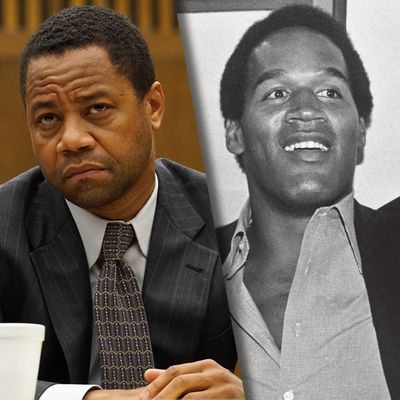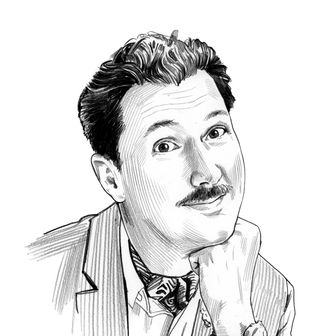
So you spent ten wonderful hours earlier this year with The People v. O.J. Simpson: American Crime Story, the critical and commercial smash that turned the trial of the century into a ten-part scripted drama that is probably going to take home as many Emmys as Simpson scored touchdowns. That means you can skip O.J.: Made in America, the exceptional eight-hour documentary that airs all this week on ESPN, right? Wrong!
Yes, two of the best shows of this year are about O.J. Simpson, and they share some thematic similarities, but they are not the same at all. Here’s your guide to the most crucial differences.
DIFFERENT: O.J. Simpson, Superstar. Director Ezra Edelman, the mastermind behind O.J.: MIA, doesn’t even get to the murder of Nicole Brown Simpson until the third of the five episodes of the series. That means there are four full hours of what made O.J. Simpson famous in the first place. For those who learned about him through the tabloids rather than the Buffalo Bills, there’s a lot about his sports career, which is detailed in the first episode (this is ESPN after all) and his subsequent fame as a sportscaster, actor, and general entertainer, all detailed in the second episode. The reasons how and why O.J. captivated Americans is essential to understanding the hugeness of the murder trial, including the difficulty of a black man turning athleticism into lasting fame and financial security.
SAME: Trial Strategy. Just like in PVOJ, the documentary shows how Robert Shapiro figured out how to make race the real issue of the trial, something that Johnny Cochran repeatedly brought home for the mostly black jury. Cochran died in 2005, but his associate, Carl Douglas, gives extraordinarily candid interviews about what was going on inside the legal dream team and how that played out in public over the course of the trial. If you thought seeing what John Travolta and Courtney B. Vance got up to was crazy, wait until you hear it from the horse’s mouth.
DIFFERENT: O.J. Simpson, Up Close and Personal. Since the audience saw so little of O.J.’s pre-trial life in PVOJ, it’s hard to understand the charisma and influence that Simpson had. O.J.: MIA gets to the core of O.J.’s personality, someone who needed to be adored and could use the adulation of the public to manipulate them. It shows the contradictions in his behaviors: not only how he successfully integrated himself into a white world and wanted to appear ordinary, but also how he could have violent rages in private, which become damningly clear in a series of Nicole Brown’s 911 calls featured in O.J.: MIA.
SAME: Race and the LAPD. One of the key points in both shows is how the LAPD’s racist history was what ultimately acquitted O.J. Simpson. The department had mistreated the black community for so long, it wasn’t difficult for the jury to believe that Mark Fuhrman could have framed Simpson for the crimes. O.J.: MIA delves even further into this history, going back before the Rodney King beatings to the slaying of Eulia Love, who was gunned down by police in her front yard over a $22 gas bill. It shows a deeper history of cruelty, and it is absolutely stunning when one of the jurors from the trial says that O.J.’s acquittal was retribution for Rodney King’s assailants acquittal.
DIFFERENT: The Fame Game. PVOJ was much more interested in the ideas of race and police brutality, and how that played into O.J. getting away with murder. It was never incredibly concerned with the role that celebrity and fame played in both the making of and dismantling of the O.J. Simpson myth. O.J.: MIA really gets into why Americans are so feverish for these stories of men who come from nothing and use their talent to make better lives, and how those men are repaid with favorable treatment. While race is obviously a huge factor in this story, O.J.’s fame often trumped his race.
SAME: The Redemption of Marcia Clark. The best thing to come out of PVOJ was Marcia Clark being seen not as a bumbling prosecutor, but as a feminist icon. Sarah Paulson should, and likely will, win an Emmy for her performance, but the real Marcia Clark does an excellent job redeeming herself in O.J.: MIA. She bares everything for the cameras and talks soberly and eloquently about how the police, and then the men around her, weakened the prosecution, and how hard she fought to bring this man to justice. The court may have acquitted O.J., but history is going to acquit Marcia Clark.
DIFFERENT: The Aftermath. My favorite of the five episodes of O.J: MIA is the fifth and final one, which takes a look at the impact of the Simpson verdict not only on America, but also on the man himself. It shows a man shut out of the Brentwood community he worked so hard to belong to his whole life, and how he could only find acceptance in the black community he always shunned. It shows a man who thought he could get away with everything, spiraling out of control. We see the price O.J. paid for his victory in court, and the consequences it had on us as a nation.


